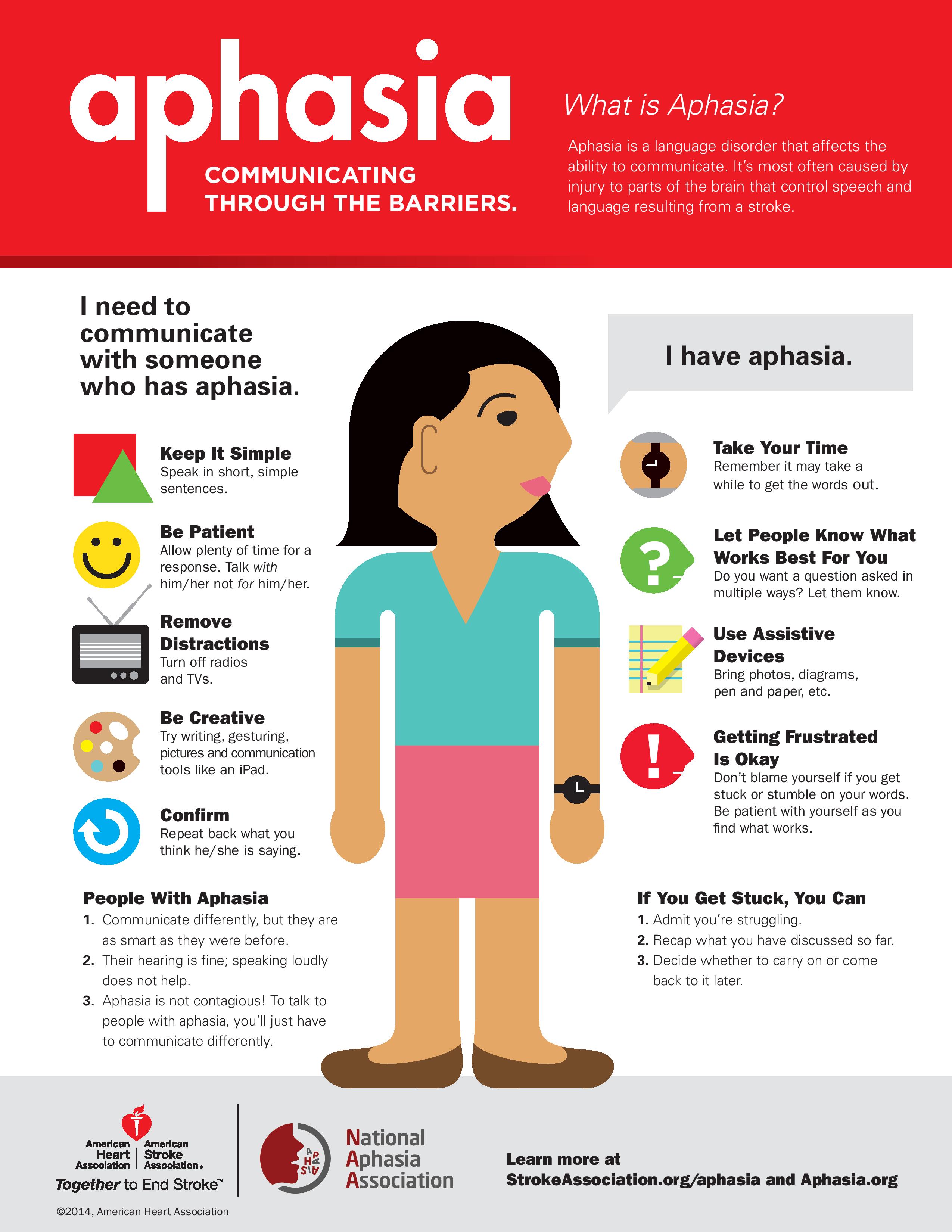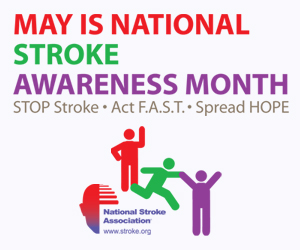
• Be patient
Let the stroke survivor do things in their own time. If there’s something that’s frustrating you, explain the problem calmly and focus on what you can both do to make it better.
• Don’t over-complicate
Don’t make things too complicated if the stroke survivor is finding it hard to concentrate or remember things. Help them in the right way: break tasks down into individual steps, give simple instructions, one at a time, rather than a list of things to do. Get to the point.
• Encourage
Practise exercises with the stroke survivor and think of ways to make them fun. Cooking a meal can be a good way to practise planning and problem-solving, for example. If progress is slow it can be easy to think that things will never get better, so help them by celebrating all their successes, however small.
• Don’t do everything for them
It’s normal to want to do as much as possible for your loved one. But it will be better if you help them to do things on their own rather than do it all for them. So, if they ask you what day it is, suggest they look at the paper to find out. Maybe lay their clothes out, so they may be able to dress themselves, or ingredients to make a sandwich.
• Help them get support
Cognitive problems are often missed by doctors and sometimes it can be difficult to get them taken seriously. However, you need to trust that you know the survivor – your friend or loved one – better than they do, so don’t be afraid to keep pushing to get the support you need. If you don’t think you’re getting the right support from your doctor or stroke team, then call our Stroke Helpline on 0303 3033 100.
• Find new ways to communicate
If the survivor isn’t able to communicate in the same ways as before, then you’re going to need to learn new ways to do it too. Ask them what helps. Get involved with their speech and language therapy as much as you can. Many people with communication problems say they feel invisible because people forget that they have something to say or aren’t willing to put the effort in to find out. Make sure you include the person in activities and conversations.
_
· When stroke strikes, part of your brain shuts down. And so does a part of you. That’s because a stroke happens in the brain, the control centre for who we are and what we can do. It happens every five minutes in the UK and changes lives instantly. Recovery is tough, but with the right specialist support and a ton of courage and determination, the brain can adapt. Our specialist support, research and campaigning are only possible with the courage and determination of the stroke community and the generosity of our amazing supporters. We’re rebuilding lives after stroke. We’re here to support you to rebuild your life after stroke. If you need information or just want someone to talk to, call us on 0303 3033 100 or visit stroke.org.uk
Startling research unveiled today shows nearly half (45%) of people(i) who know a survivor of stroke personally admitting that they are struggling to support them to make their best possible recovery, according to new findings(ii) published today by the Stroke Association.
The research reveals that one important reason for the lack of stroke support for survivors stems from a lack of awareness of what stroke is and how it affects people. Shockingly, more than a quarter (27%) of the public(ii) don’t know where in the body a stroke occurs: the brain. For those that know a stroke survivor, a huge 82%(i) feel that a greater understanding of stroke would help them support the survivor better. All this, despite stroke being the country’s leading cause of disability.
The research(i) also found that of those who know someone personally who has had a stroke:
• Nine in 10 (95%) agreed that family and friends play an essential role in the recovery process.
• Nearly half (46%) admitted wanting to do more to help the stroke survivor that they knew but lacked the knowledge to do so.
• Nearly a fifth (18%) say they do not properly understand the overall impact of the condition.
In a separate survey(iii) of stroke survivors, more than four out of five (85%) of stroke survivors said the people they had daily contact with did not understand the impact of the stroke. This ‘knowledge gap’ is preventing survivors getting the support they need from those closest to them, and stopping survivors from making the best possible recovery to rebuild their lives after stroke.
Elizabeth Kay, aged 24 from Salford, had a stroke in August 2017, while her dad was helping her to move into her new home. Elizabeth said: “I’d had a bad headache for around an hour. It then got worse and my legs just gave way and I collapsed. The paramedics could see my face had dropped on one side and my speech was slurred. I just didn’t think it could happen at my age.”
Elizabeth was taken straight to Salford Royal Hospital where she underwent an operation to remove the clot from her brain. She also needed a craniotomy, to reduce pressure by giving her brain room to swell.
Elizabeth said: “I don’t remember anything at all about the first week in hospital. Although I could speak, my voice was different and I struggled to think of the right words. My left side was completely paralysed. After intense physiotherapy I learnt how to stand and take a couple of steps. The movement in my arm didn’t come back for the first month; in fact, the doctors said there was a chance it may never return. Fortunately, I can now move my arm but my fingers and wrist can’t move properly.”
“I would say since my stroke, my family and I have learnt together. At first, I found it very hard, as my family wanted to pander to me and do everything for me, just because they love and care for me. Now we’re in a better routine and they know to wait for me to ask for help. They don’t automatically do things. That’s the trickiest part, finding the balance between being overbearing and taking away your independence, and being loving and supportive.”
The charity published its findings to mark the launch of its newest campaign, Rebuilding Lives, which aims to showcase the challenges faced by stroke survivors and those who support them with their recoveries. Other findings reveal the damaging effects that stroke can have on social networks and relationships:
• More than one in 10 respondents admitted to seeing the survivor less after the latter had a stroke.
• More than one in six of those who know a stroke survivor, admitted spending less time with them because the latter was perceived as not being the same person following the stroke.
• A quarter (25%) said there had been a drop in social activity on the part of the stroke survivor.
Juliet Bouverie, Chief Executive of Stroke Association, comments: “A stroke happens in the brain, the control centre for who we are and what we can do. The impact varies depending on which part of the brain is affected. It could be anything from wiping out your speech and physical abilities, to affecting your emotions and personality. So, it’s a real challenge for everyone as they come to grips with this sudden and life changing event. These findings highlight the complexity of stroke and raises the desperate need amongst people to understand the impact of stroke in order to better support their loved ones.
“There are over 1.2 million stroke survivors living in the UK – many of whom are reliant on their friends and family, from help with daily living to understanding their emotional and mental health needs.
“It doesn’t have to be this way. We’re urging those people who know someone who has had a stroke to help turn this around and fill this knowledge gap. Reach out to the Stroke Association for help, so that together we can support stroke survivors to rebuild their lives.”
For more information about Rebuilding Lives or about stroke, visit www.stroke.org.uk/rebuildinglives.
For more information about what you can expect after a stroke, the Stroke Association has partnered with the Royal College of Physicians to produce a booklet accessible here: https://tinyurl.com/yyqj638z



